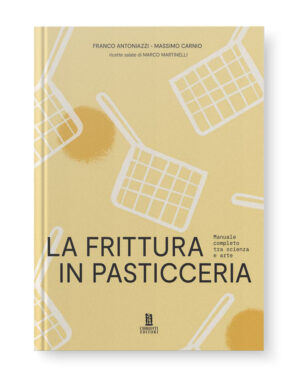Chiudi
Glaciale – architettura del semifreddo
€ 42,99 - € 80,00Fascia di prezzo: da € 42,99 a € 80,00Pasticceria Evolutiva – Logica, Didattica e Contemporaneità
€ 49,99 - € 90,00Fascia di prezzo: da € 49,99 a € 90,00CLASSICO FUTURO – La pasticceria semplice, leggera e pratica
€ 44,99 - € 85,00Fascia di prezzo: da € 44,99 a € 85,00Il volo di un Piaf – Decor 2000
€ 29,99 - € 55,00Fascia di prezzo: da € 29,99 a € 55,00Fragile – Artistic sugar technique and philosophy of the world champion
€ 88,99 - € 120,00Fascia di prezzo: da € 88,99 a € 120,00TuttoGelato
€ 20,00 - € 40,00Fascia di prezzo: da € 20,00 a € 40,00Pasticceria Internazionale
€ 4,99 - € 135,00Fascia di prezzo: da € 4,99 a € 135,00The GELATO you are looking for
€ 22,99 - € 50,00Fascia di prezzo: da € 22,99 a € 50,00Il Mais in Italia – Storia Naturale e Agricola
€ 19,90 - € 50,00Fascia di prezzo: da € 19,90 a € 50,00Il cibo l’uomo e la cultura
€ 19,90 - € 50,00Fascia di prezzo: da € 19,90 a € 50,00MATER FERMENTUM – La genesi della pasta fermentata
€ 52,99 - € 90,00Fascia di prezzo: da € 52,99 a € 90,00Fragile – Lo zucchero artistico, tecniche e filosofia del campione del mondo
€ 89,99 - € 120,00Fascia di prezzo: da € 89,99 a € 120,00La frittura in pasticceria – manuale completo tra scienza e arte
€ 28,99 - € 50,00Fascia di prezzo: da € 28,99 a € 50,00Nuovo abbonamento Alimenti Funzionali + Gift Card 10€ in regalo!
€ 20,00 - € 40,00Fascia di prezzo: da € 20,00 a € 40,00Nuovo abbonamento Industrie Alimentari + Gift Card 10€ in regalo!
€ 70,00 - € 150,00Fascia di prezzo: da € 70,00 a € 150,00Nuovo abbonamento Ingredienti Alimentari + Gift Card 10€ in regalo!
€ 50,00 - € 105,00Fascia di prezzo: da € 50,00 a € 105,00Nuovo abbonamento Tecnica Molitoria + Gift Card 10€ in regalo!
€ 55,00 - € 125,00Fascia di prezzo: da € 55,00 a € 125,00Nuovo abbonamento TuttoGelato + Gift Card 10€ in regalo!
€ 20,00 - € 40,00Fascia di prezzo: da € 20,00 a € 40,00Nuovo abbonamento Industrie delle Bevande world wide bottling + Gift Card 10€ in regalo!
€ 45,00 - € 100,00Fascia di prezzo: da € 45,00 a € 100,00























